The VR-210 form, provided by the Maryland Motor Vehicle Administration (MVA), enables individuals with disabilities to apply for parking placards or license plates, ensuring accessible parking solutions.
1.1 Purpose of the VR-210 Form
The VR-210 form is designed to enable individuals with disabilities to apply for parking placards or license plates, allowing them to park in designated disability spaces. It serves as the official application for requesting these accommodations, ensuring accessibility and convenience for those with mobility challenges. The form is provided by the Maryland Motor Vehicle Administration (MVA) and is essential for verifying eligibility and processing disability parking privileges.
1.2 Importance of the Form for Individuals with Disabilities
The VR-210 form is crucial for individuals with disabilities as it provides legal verification of their eligibility for parking accommodations. By completing this form, they gain access to reserved parking spaces, ensuring easier mobility and independence. It streamlines the process of obtaining necessary permits, making daily activities more manageable. The form’s certification ensures that parking privileges are granted fairly and consistently, adhering to state regulations.
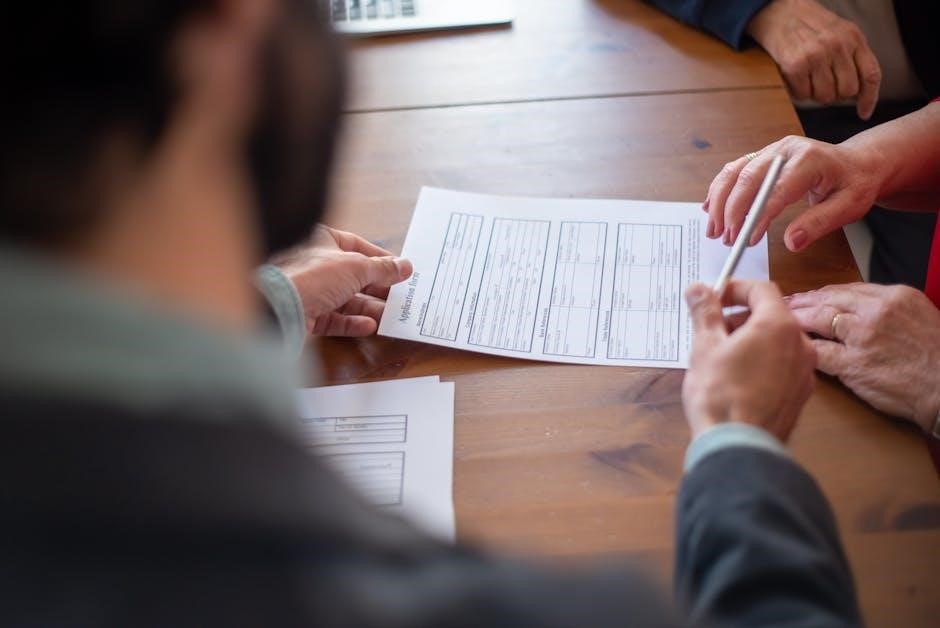
Overview of the VR-210 Application Process
The VR-210 application process involves completing the form, obtaining physician certification, and submitting it to the MVA. It ensures individuals with disabilities can access parking accommodations efficiently.
2.1 Step-by-Step Guide to Completing the Form
Start by downloading the VR-210 form from the MVA website or picking it up in person. Fill in personal and vehicle details accurately. Next, schedule an appointment with your physician to complete the disability certification section. Ensure all information is correct and legible. Gather required documents, such as identification and proof of residency. Finally, submit the form either by mail to the MVA Disability Unit or in person at a full-service MVA office.
2.2 Required Documentation for Submission
To complete the VR-210 application, you must provide specific documents. These include valid identification, proof of Maryland residency, and a completed physician certification. Additionally, a check or money order for fees is required. Ensure all documents are up-to-date and legible. Incomplete submissions may delay processing. For accurate submission, refer to the MVA’s official guidelines or consult their website for the most current requirements.
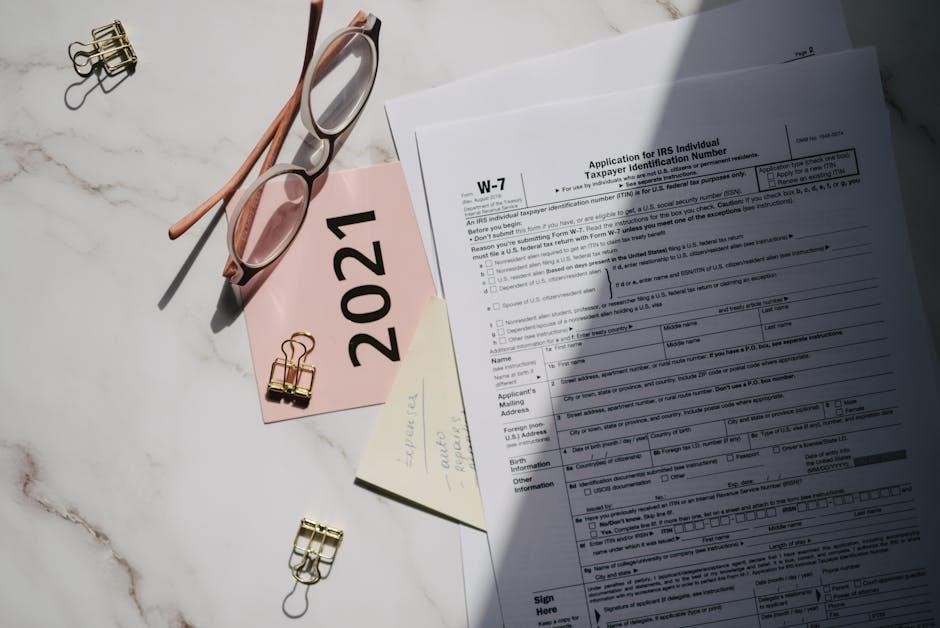
Eligibility Criteria for the VR-210 Application
The VR-210 application requires applicants to meet specific medical criteria for disability certification, ensuring only qualified individuals receive parking privileges. Eligibility is based on medical conditions that limit mobility.
3.1 Medical Requirements for Disability Certification
A licensed physician must certify the applicant’s disability, confirming conditions like inability to walk 200 feet, neurological or orthopedic impairments, or other mobility-limiting disabilities. Temporary disabilities require recertification, while permanent conditions may not. The physician’s section is critical for approval, ensuring only qualified individuals receive parking privileges. Specific medical criteria must be met to validate eligibility for disability parking accommodations.
3.2 Types of Disabilities Eligible for Parking Placards
Eligible disabilities include those causing severe mobility impairment, such as inability to walk 200 feet, chronic lung disease, or heart conditions. Neurological or orthopedic disabilities also qualify. Temporary disabilities, like post-surgery recovery, may receive short-term placards. Visual impairments or disabilities requiring assistive devices are also eligible. The form specifies conditions that justify parking accommodations, ensuring access for those needing convenient parking solutions. Disabled veterans with special license plates are also accommodated under this program.
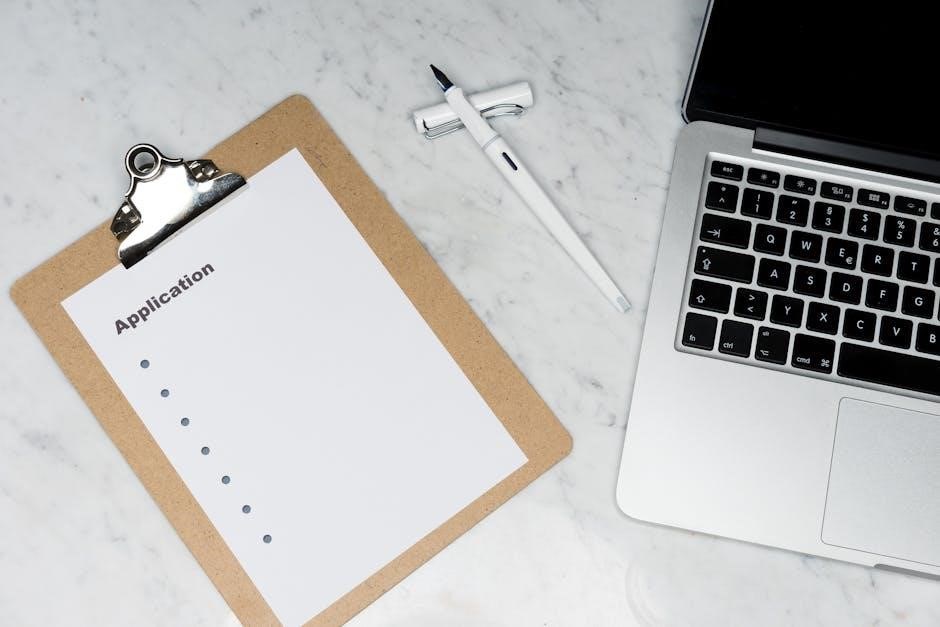
How to Obtain the VR-210 Form
The VR-210 form can be downloaded from the MVA website or obtained in person at local MVA offices, ensuring easy access for all applicants.
4.1 Downloading the Form from the MVA Website
Visit the official MVA website and navigate to the disability parking section. The VR-210 form is available for download in PDF format, ensuring easy access. Make sure to use the latest version, as outdated forms may not be accepted. Once downloaded, print the form and fill it out carefully. For assistance, refer to the step-by-step guide provided on the MVA website. This method is convenient and saves time compared to in-person visits. The website URL is https://mymd.mva.com.
4.2 Picking Up the Form in Person at MVA Offices
Individuals can visit any full-service MVA office to obtain the VR-210 form in person. Locations include Beltsville, Largo, Gaithersburg, and Glen Burnie. This option is ideal for those who prefer in-person assistance or lack access to a printer. MVA staff can provide guidance and ensure you have the correct form. Visit the MVA website for a list of offices and operating hours.
Completing the VR-210 Form
The VR-210 form requires personal and vehicle details, along with a physician’s certification of disability. Ensure all sections are filled accurately for proper processing of your application.
5.1 Filling Out Personal and Vehicle Information
Accurately complete the personal and vehicle sections of the VR-210 form. Provide your full name, address, and contact information. For vehicle details, include the make, model, year, and license plate number. Ensure all information matches MVA records to avoid delays. This step is crucial for verifying your eligibility and ensuring the placard is issued correctly. Double-check your entries for accuracy before proceeding to the physician certification section.
5.2 Physician Certification Section
The physician certification section is a critical part of the VR-210 form. A licensed doctor must verify your disability by completing this section, confirming the type and duration of your condition. They will specify whether your disability is temporary or permanent. Ensure the physician includes their contact information and signature, as this validates your eligibility. Accurate and complete certification is essential for timely processing of your application.

Submitting the Completed VR-210 Form
Submit the completed VR-210 form by mailing it to the MVA Disability Unit at 6601 Ritchie Highway, Glen Burnie, MD 21062, or in person at a full-service MVA office.
6.1 Mailing the Application to the MVA Disability Unit
To submit the VR-210 form by mail, send it to the MVA Disability Unit at 6601 Ritchie Highway, Glen Burnie, MD 21062. Include a check or money order for fees, as cash is not accepted. Ensure the form is fully completed, including the physician’s certification, and attach all required documentation. Mail the application with proper postage to avoid delays. Processing typically begins upon receipt;
6.2 In-Person Submission at Full-Service MVA Offices
Individuals can submit the completed VR-210 form in person at any full-service MVA office. This option allows for immediate processing and the opportunity to address any questions or issues. Bring the fully completed form, physician certification, payment, and proper identification. Offices are located in areas like Beltsville, Largo, Gaithersburg, and Glen Burnie. In-person submission ensures faster handling and avoids mailing delays, providing a convenient alternative for applicants.
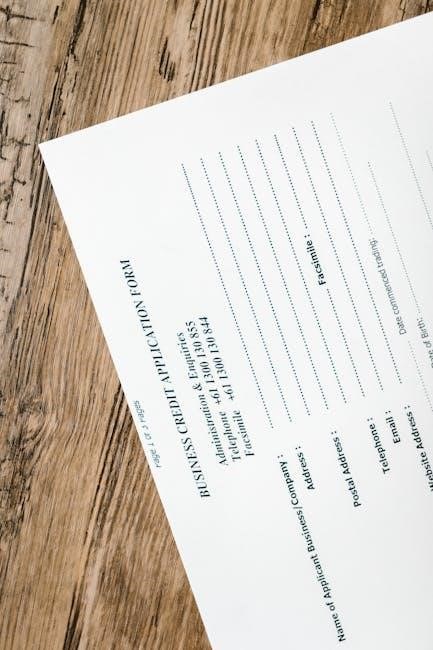
Processing Time and Fees
The VR-210 application typically processes within 2-4 weeks. Fees apply for placards and license plates, while temporary placards are issued at no cost to applicants.
7.1 Average Processing Time for Applications
The VR-210 application typically processes within 2-4 weeks. Processing times may vary depending on the completeness of the application and mail delivery. Applicants can check the status online or contact MVA customer service for updates. Once approved, placards or plates are mailed directly. Temporary placards are usually issued quickly, while permanent ones may take longer. Ensure all required documents are submitted to avoid delays. For more details, visit the MVA website or contact their office.
7.2 Associated Fees for Placards and License Plates
The VR-210 application may involve fees for placards and license plates. Temporary placards are typically free, while permanent placards and license plates require a fee. Costs vary depending on the type of placard or plate requested. For example, permanent placards may cost $20, and license plates could range from $25 to $50. Disabled veteran plates may have additional fees. Payment methods accepted include checks or money orders. Fees are subject to change, so check the MVA website for the most current information.
Required Documents for the VR-210 Application
The VR-210 application requires identification, proof of residency, and medical certification. Applicants must submit valid ID, residency documents, and a completed physician certification section for processing.
8.1 Identification and Proof of Residency
To complete the VR-210 application, applicants must provide valid identification and proof of Maryland residency. Acceptable ID includes a driver’s license, state ID, or passport. Proof of residency can be a utility bill, lease agreement, or bank statement. These documents ensure eligibility and verify the applicant’s Maryland residency status for disability parking privileges. Submission of these materials is mandatory for processing the application effectively.
8.2 Medical Certification and Supporting Documentation
The VR-210 application requires a physician’s certification to confirm the applicant’s disability. A licensed doctor must complete this section, detailing the nature and duration of the disability. The form must include the physician’s signature and medical license number. Supporting documentation, such as medical records or diagnostic reports, may be requested to validate the disability. This step ensures the application meets MVA requirements for issuing disability parking privileges. Accurate and complete medical information is essential for approval.
Types of Parking Placards and License Plates
The VR-210 application offers temporary and permanent disability placards, with red for short-term and blue for long-term disabilities. Special license plates are also available for disabled veterans.
9.1 Temporary vs. Permanent Placards
The VR-210 application distinguishes between temporary and permanent placards. Temporary placards, typically red, are issued for short-term disabilities, lasting up to six months. Permanent placards, usually blue, are for ongoing disabilities with no expiration date. Both require medical certification, but temporary placards must be renewed if the disability persists beyond the initial period. Applicants must specify their needs on the form to receive the appropriate placard type.
9.2 Special License Plates for Disabled Veterans
Disabled veterans in Maryland can apply for special license plates through the VR-210 form. These plates are designed to honor their service and provide disability parking privileges. Eligible veterans must submit proof of military service and disability certification. The plates are issued in addition to standard disability placards, offering a unique way to recognize their contributions while ensuring accessible parking. This option is exclusively available to veterans with certified disabilities.
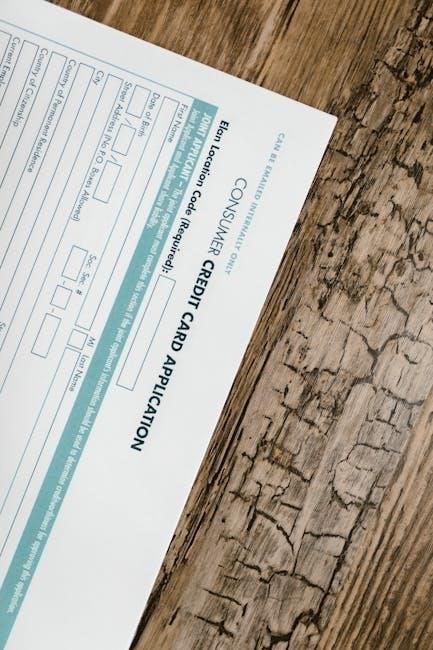
Benefits of the VR-210 Application
The VR-210 application provides individuals with disabilities access to reserved parking spaces, enhancing mobility and independence. It also offers convenience for those needing specialized parking accommodations.
10.1 Access to Disabled Parking Spaces
The VR-210 application grants individuals with disabilities access to reserved parking spaces, enhancing mobility and independence. These spaces are strategically located for ease of access, ensuring convenience for those with mobility challenges. By obtaining a placard or license plate, applicants can legally park in designated areas, promoting equal access to public spaces, businesses, and services. This benefit is essential for improving quality of life and facilitating daily activities without unnecessary obstacles.
10.2 Reciprocity with Other States
The VR-210 application ensures that Maryland-issued disability placards and license plates are recognized in other states, providing nationwide accessibility. This reciprocity allows individuals with disabilities to park in designated spaces across the U.S., simplifying travel and ensuring consistent access to parking accommodations. The uniform recognition of these credentials enhances mobility and independence for individuals with disabilities, making cross-state travel more convenient and stress-free.

Maintaining Eligibility for Disability Parking Privileges
Maintaining eligibility requires adhering to MVA guidelines, including renewal processes and reporting any changes in disability status to ensure continued access to parking privileges.
11.1 Renewal Process for Placards and Plates
To maintain disability parking privileges, individuals must renew their placards or plates before the expiration date. The renewal process involves submitting a completed VR-210 form to the MVA Disability Unit. Applications can be mailed to 6601 Ritchie Highway, Glen Burnie, MD 21062. Ensure all required documentation and fees are included to avoid delays. Timely renewal ensures uninterrupted access to disability parking benefits.
11.2 Reporting Changes in Disability Status
Individuals must notify the MVA of any changes in their disability status that may affect their eligibility for parking privileges. Updates should be submitted promptly to ensure continued compliance with program requirements. Failure to report changes may result in the revocation of disability parking benefits. Submitting an updated VR-210 form with revised medical certification, if necessary, helps maintain accurate records and uninterrupted access to disability parking accommodations.

Common Mistakes to Avoid When Filing the VR-210
Common errors include submitting incomplete forms, providing incorrect information, and omitting the required physician certification. Ensure all sections are filled accurately to avoid processing delays.
12.1 Incomplete or Incorrect Information
One of the most frequent issues with the VR-210 form is incomplete or incorrect information. This includes missing personal details, vehicle information, or failing to sign the application. Even minor errors, such as typos or outdated addresses, can delay processing. Applicants must carefully review each section to ensure accuracy. Double-checking all fields before submission is crucial to avoid rejection or additional delays. Incomplete applications are often returned, requiring resubmission and extending the wait time for disability parking privileges.
12.2 Missing or Invalid Physician Certification
Missing or invalid physician certification is a common issue that delays VR-210 processing. The form requires a licensed physician’s signature and detailed medical information to confirm the disability. If the certification is incomplete, illegible, or unsigned, the application will be rejected. Applicants must ensure their physician accurately completes this section, providing clear and valid medical details. Failure to do so results in processing delays or the need to resubmit the application with corrected documentation.
Troubleshooting Application Issues
Denied applications or lost placards require immediate attention. Contact MVA customer service for assistance or use online tools to resolve issues efficiently and avoid delays.
13.1 Denied Applications and Appeal Process
If your VR-210 application is denied, review the reasons provided by the MVA. Submit additional documentation or clarification as requested. Contact the MVA Disability Unit at 6601 Ritchie Highway, Glen Burnie, MD 21062, or visit their website for further guidance. Applicants can also appeal the decision by following the outlined procedures in the denial notice, ensuring all required information is addressed to facilitate a successful review process.
13.2 Lost or Stolen Placards and Replacement Process
If your parking placard is lost or stolen, contact the MVA immediately. Complete a new VR-210 form, ensuring all sections are filled accurately. Submit the form along with proper identification and a written explanation of the loss or theft. Mail the documents to the MVA Disability Unit at 6601 Ritchie Highway, Glen Burnie, MD 21062. A replacement placard will be issued upon verification of eligibility and receipt of the required information.
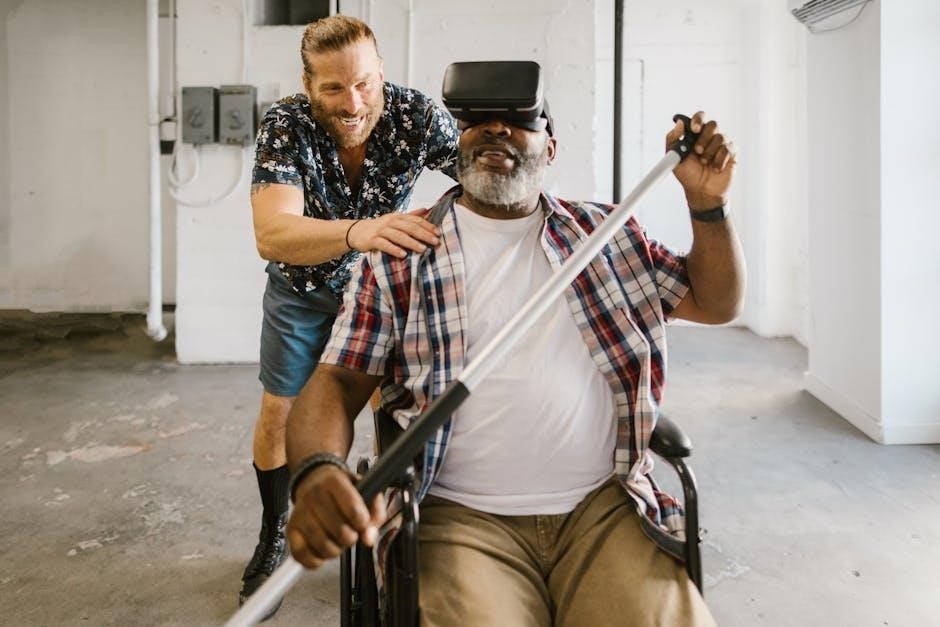
Additional Resources for Applicants
Visit the MVA website for downloadable guides, FAQs, and step-by-step instructions. Contact MVA Customer Service at 1-800-950-1682 for assistance. Utilize online tools for form completion and submission.
14.1 MVA Customer Service Contact Information
Applicants can contact the MVA Customer Service at 1-800-950-1682 for assistance with the VR-210 form or disability parking-related inquiries. The MVA office is located at 6601 Ritchie Highway, Glen Burnie, MD 21062. Visit the official MVA website for additional contact options, including email and live chat support. Representatives are available to help with form completion, submission, and any other questions regarding disability parking privileges in Maryland.
14.2 Online Tools and Guides for Assistance
The MVA website offers downloadable fillable PDF versions of the VR-210 form, along with step-by-step guides for completion. Online tools like airSlate SignNow allow users to fill, sign, and submit the form digitally. Additionally, the MVA provides an online portal for uploading completed applications, streamlining the process. These resources ensure applicants can efficiently navigate the disability parking application process from the comfort of their homes.
The VR-210 form is a crucial tool for individuals with disabilities to access convenient parking solutions in Maryland. By following the outlined steps and utilizing online resources, applicants can efficiently complete and submit their applications. Ensuring all required documentation and certifications are accurate and complete will help avoid delays. This process supports independence and mobility, making disabled parking privileges accessible to those who need them. Proper use of the form ensures compliance with state regulations and promotes inclusivity.